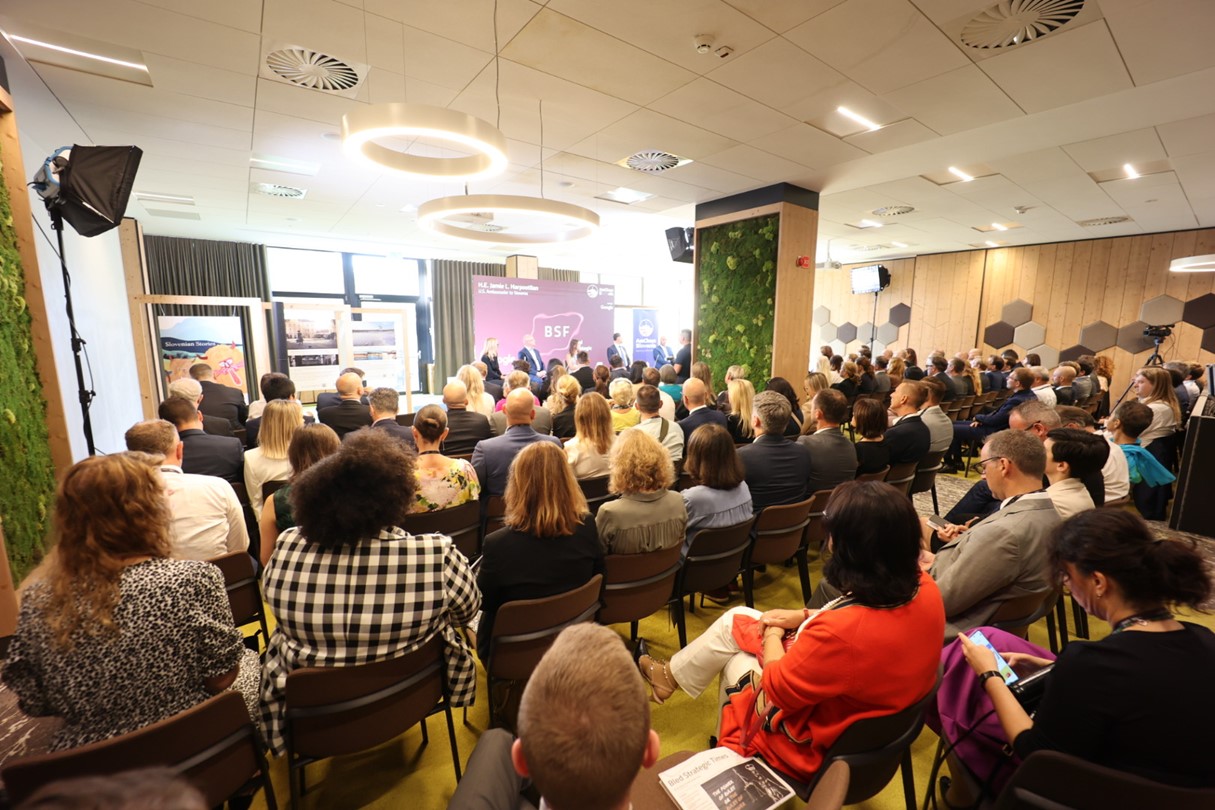AmCham Business Breakfast in cooperation with the Bled Strategic Forum
Bled, 30 August – Sustainability criteria enshrined in the concept of environmental, social, and governance (ESG) are a tool for a safer and better future, stressed the participants of Tuesday’s AmCham business breakfast at the Bled Strategic Forum. Engagement, empowerment and leading by example are necessary for the success of this process, the panellists stressed.
The discussion, entitled ESG: An Imperative or Just Another Buzzword?, heard US Ambassador to Slovenia Jamie L. Harpootlian note that similar ideas about how companies can respond to people’s needs while acting in a socially responsible way already emerged nearly 100 years ago.
She believes that people have recognised the major challenges facing humanity and that these pose serious risks to business as well. The window of opportunity for appropriate action is small and what will be required is joint action by business and governments, supported by capital markets, she added.
Dejan Verčič, professor at the Faculty of Social Sciences in Ljubljana, also pointed out that ESG criteria extend beyond environmental concerns and socially responsible behaviour of companies, banks, investors, etc., to also include risks involved in the operations of companies, countries and other stakeholders.
While noting that poor risk management had for instance led to Europe’s dependence on Russian energy, Verčič said that raising awareness about the process and communicating its importance on the ground, among citizens, consumers, farmers and company employees, and involving everyone would be crucial.
He sees a central role for young people, who are particularly aware that the continuation of current trends is leading to failure, a point that was echoed by Economy Ministry State Secretary Matevž Frangež.
The old system is slowly dying, but what the new one will be is not yet fully defined, Frangež said. ESG can be a positive prospect for getting out of this current crossroads of various crises, he argued, suggesting a failure to find an alternative to the current situation could lead to a very dangerous world.
Ljubljana Faculty of Economics professor Adriana Rejc Buhovac also spoke about the importance of inclusion, communication, empowerment and leading by example at company level. It’s not just about complying with legislation governing the reporting on ESG standards, it’s about companies showing what is possible, she said.
Calling for more ambitions changes to business models, products and services, Rejc Buhovac argued companies will have to be much more aware of the values of their employees and fully involve them in the processes. She also finds it important that the positive impact of the measures is clearly demonstrated.
Rowan Barnett, director for Europe, the Middle East and Africa at the Google foundation Google.org, believes that the current crisis is one of the biggest catalysts for action.
We need to use all the levers at our disposal, he stressed, highlighting the role of businesses but also the importance of pressure from people and employees, as well as action by governments and investors.
John Denhof, CEO of the bank Nova KBM, sees clear action plans and, above all, better data and measurable and quantified targets for ESG activities as indispensable, with all the essential players working in concert.
But success will not come without awareness and pressure from consumers, through directing their consumption towards more sustainable products and services, Denhof added.
At the moment, everyone is aware that something is happening, but not everyone is on the same train yet, he illustrated, arguing business leaders must both know how to act and inspire others to act.
Source: STA

